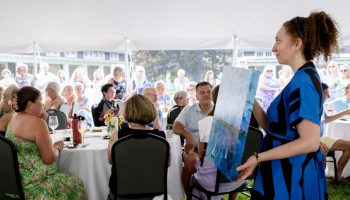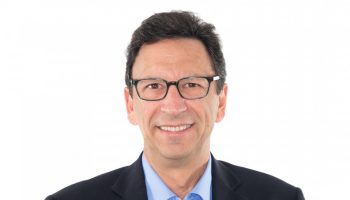At the season’s first Chautauqua Institution Board of Trustees Open Forum, President Michael E. Hill and Board Chair Jim Pardo discussed the strategic plan and addressed questions and concerns from attendees.
Hill and Pardo — who also lead the Strategic Plan Information Sessions with Strategic Planning Working Group Chair Laura Currie — opened last Saturday morning in the Hall of Philosophy with an in-depth look at 150 Forward, a series of key objectives aimed at launching the Institution into its sesquicentennial in 2024.
“The vision was really about setting the stage so that Chautauqua could create an informed, engaged and renewed public that fosters, and actively contributes to, a more civil society nationally and within our various communities represented by our individual constituents and partners,” Hill said.
The first objective essentially seeks to improve the in-season Chautauqua experience; the second objective is to broaden and expand programming to outside the grounds and during the off-season.
“If we do this second objective right and we’re building brand for Chautauqua, and we’re helping more people understand what happens here, it should help us with that first goal of bringing more people here,” Hill said.
The final objectives are: to improve the health of Chautauqua Lake with science-based methodology and to grow revenue. Underscoring these objectives are four cross-cutting imperatives: strategic partnerships, mobilization of technology, labor and talent solutions, and IDEA — inclusion, diversity, equity and accessibility.
“When we talk about diversity, we’re not just talking about bringing more African Americans to the grounds,” Hill said in response to an audience question about diversity. “There’s nothing more insulting than saying, ‘We want diversity, so we need to bring down gate passes and provide subsidized housing,’ as if white people only have resources.”
These objectives were identified by the 13-member Strategic Planning Working Group, chaired by Currie, after more than 18 months of community querying and data mining. A trustee committee is implementing the plan, led by incoming board chair Candy Maxwell and Chief of Staff and Vice President of Strategic Initiatives Shannon Rozner.
During the second half of the morning’s proceedings, Pardo opened the floor for Chautauquans to ask questions or comment. Concerns were raised about sustainability, including eliminating single-use plastics and regulations for solar panels on private homes.
Hill said administrators are working with a group of young Chautauquans on an “environmental audit” to identify areas of improvement. John Shedd, vice president of campus planning and operations, said the Institution is revisiting its policy on solar panels, which currently prohibits private homes from installing solar panels if visible from roads or sidewalks.




